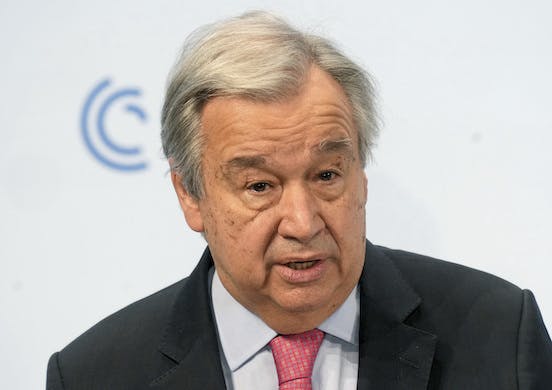U.N. Boss, Spurning Diplomatic Niceties, Wheels on Russia
Criticism that is harsh in the context of the United Nations has been repeated by Antonio Guterres for days and is completely out of character.

The United Nations chief, Antonio Guterres, is widely considered a top-notch diplomat, one who’d refrain from offending anyone, and especially the powerful. The Ukraine crisis, however, is pitting the Portuguese-born secretary-general against one of Turtle Bay’s top players — Russia.
Is Mr. Guterres signaling a change of tack, promising to be more assertive in his second term than he was in his first?
In Turtle Bay-speak, the U.N. secretary-general, who is considered an objective, nonpartisan player, may at any time offer his “good office” for mediating hot disputes. Mr. Guterres, however, has of late been uncharacteristically critical of the Kremlin — and Moscow is irritated.
Russia’s envoy to the world body, Vasily Nebenzya, indicating his idea that Mr. Guterres is following cues from the West, told the General Assembly today that “in these circumstances, we don’t understand what good office [that the] secretary-general talked about can be provided to the people.”
The General Assembly session followed several recent emergency meetings on Ukraine at the Security Council. The council is gathering tonight. As Russia holds veto power, and, to boot, serves as council president for the month of February, though, no concrete action has come out of that top United Nations body, beyond almost universal condemnations of Moscow.
The action, or lack thereof, also moved to the Assembly. There, in his opening remarks, Mr. Guterres said today that Russia’s decision “to recognize the so-called independence of certain areas of Donetsk and Luhansk regions and the follow-up are violations of the territorial integrity and sovereignty of Ukraine and inconsistent with the principles of the [U.N.] Charter.”
That criticism — harsh in the context of the United Nations — has been repeated by Mr. Guterres for days and is completely out of character.
Mr. Guterres launched his second, and final, five-year stint at the helm in January. One reason he easily sailed through last year’s re-election process, according to several diplomats, is his uncanny ability to refrain from offending key member states.
Specifically Mr. Guterres avoided, in his typical caution, clashing with the five permanent members of the Security Council — France, Britain, Russia, Communist China, and America. Each of those veto-wielding countries, known as the P5, could have sunk Mr. Guterres’s bid.
A no vote from any of them would have prevented the council from sending his candidacy to the General Assembly, which rubber-stamps the council’s recommendation. America and Russia specifically have been known to use backroom maneuvering to discourage candidates from running for the top U.N. job, or prevent their re-election. China is progressively gaining Turtle Bay’s top influence position, and can signal thumbs down on a candidacy.
Mr. Guterres carefully studied how Boutros-Boutros Ghali was pushed aside as he vied for a second term. Or how Kofi Annan’s second stint went down in flames after he publicly confronted America over the Iraq war. To avoid their fate Mr. Guterres spent his first five years, starting in 2017, in avoiding confrontations with the top U.N. powers.
Today’s General Assembly debate marks the first time Mr. Guterres publicly clashed with a P5 member, and it happened immediately after his return from Beijing, where he attended the Olympics.
Several countries, including America, avoided sending government officials to the Olympics, citing Red China’s horrific human rights violations. Asked why he preferred nevertheless to fly to Beijing for a photo-op with Premier Xi, Mr. Guterres reasoned that sports represent peace and should transcend politics.
Throughout his career Mr. Guterres studiously evaded questions about the oppression of the Uighurs, or of the clampdown on Hong Kong’s critics of communist rule. When asked, Mr.Guterres would usually revert to meaningless generalities — as in the people’s right to assemble freely. Which people? Who prevents them from such assembly? Such questions went unanswered (and often unasked).
Mr. Guterres’s pointed criticism of President Putin, then, is a new tack for the U.N. chief. Still unclear is whether it portends similar direct challenges to China, or even America. Also unclear is the question of whether Mr. Guterres’s leadership will be weakened or strengthened by his criticism of Russia.

